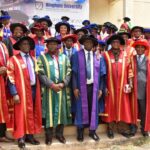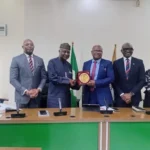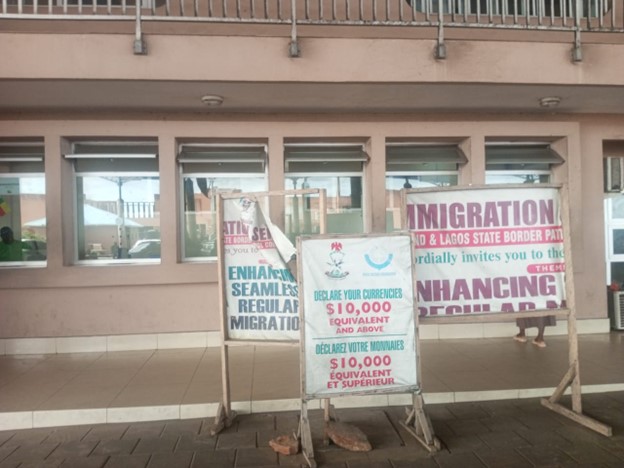By Ibukun Emiola, News Agency of Nigeria (NAN)
At West Africa’s busiest border crossings, the stories are the same; weary drivers battling endless checkpoints, passengers recounting harassment, and officials overwhelmed by fake permits and mismatched documents.
From touts collecting illegal fees at Seme to immigration officers struggling with manual records, the cracks in the region’s road transport system are visible every day.

Against this backdrop, the Economic Community of West African States (ECOWAS), in collaboration with Nigeria’s Federal Road Safety Corps (FRSC) and the West African Road Safety Organisation (WASO), is advancing the Regional Vehicle Administration and Information System (RVAIS), an initiative designed to harmonise driver’s licences and vehicle registration across the subregion.
For drivers and passengers who live the frustrations of extortion and delays, the urgency of this reform is clear: harmonisation is no longer just a policy idea, it is a necessity for safer roads, smoother travel, and stronger regional integration.
Tales from the Border
A Commercial driver, Mr Wale Olapade, knows the Lagos–Seme corridor all too well. Each trip, he says, comes with new obstacles.
“The harmonisation will ease transportation across the region.
“Right now, the process is manual, full of corruption, and fake licences are everywhere. Touts exploit us while passengers hardly know what is going on,” Olapade said.
For passengers like Mr Felix Godonu, a father of three, the experience is no better. He recalled a December 2024 journey with his family to Ghana.
“From Gbaji to the Togo border, it was harassment after harassment,” he said.
“Despite carrying passports, immigration and security officers stopped us again and again. My children still ask why we had to pay bribes to pass.”
These experiences mirror what many cross-border travellers describe as frustration, exploitation, and wasted time.
Recounting his experience, a truck driver, Alhaji Taofik Ajani, said the contrast between Nigeria and its neighbours is striking.
“In Benin, even minor offences are punished harshly. You cannot cut corners there.
“But because our systems are not unified, drivers exploit loopholes and get away with fake papers.”
Officials Admit Gaps
Border authorities agree that fragmented systems make their work difficult.
Mr Isah Sulaiman, Spokesman of the Nigeria Customs Service, Seme Area Command, told the News Agency of Nigeria (NAN) that verifying foreign driver’s licences remains a major challenge.
“There is no central database. We have procedures to admit vehicles and safeguard revenue, but harmonisation would help us check authenticity and cut fraud,” Sulaiman said.
For immigration officers, the problem goes beyond revenue.
Mr Isaac Elijah, spokesman of the Nigeria Immigration Service at Seme, said enforcement is undermined by discrepancies in national registration systems.
“A harmonised system will improve border management and reduce fraudulent practices. But we need proper training, digital tools, and sensitisation to handle resistance from drivers and even some officials,” he said.
Even licensed customs agents are impatient for change. Alhaji Bisiriyu Fanu, Former Chairman of the Association of Nigerian Licensed Customs Agents, said stakeholders were promised digital ID cards to ease movement between Nigeria and Benin.
“They asked us to submit our names and emails for processing with a bank. Once it comes out, it will be a thing of ease. No more dashed hopes,” Fanu said.
WARSO PERSPECTIVE
Mr Lateef Ramoni, Administrator and Focal Person of the West African Road Safety Organisation (WARSO), explained that the body’s role is not direct enforcement but harmonisation of safety norms and practices across the 15 ECOWAS member states and the West Africa region as a whole.
“Our mandate is to create awareness and advocacy for road safety,” he told NAN.
“Unlike Nigeria’s FRSC, most countries in the region do not have paramilitary-style road safety authorities. So our task is to build consensus, align policies, and ensure that best practices are shared.”
On the Regional Vehicle Administration and Information System (RVAIS), Ramoni said the idea is to establish a central database for vehicles and driver’s licences across the subregion.
“The goal is uniformity; one driver’s licence and one number plate system, valid across West Africa. Just like an ECOWAS passport, a driver’s licence issued in Nigeria should be recognised in Senegal or Côte d’Ivoire,” he said
He added that such a system would strengthen security by curbing multiple registrations and making it harder for stolen vehicles to be re-registered across borders.
However, implementation has been slow.
According to him, only a few countries have so far keyed into the scheme, in spite of financial backing pledged by the African Development Bank in 2015.
“The vision is clear, but progress depends on political will,” he said.
“Different histories, political systems and languages in the region make harmonisation challenging. Without strong buy-in from heads of state, it will remain a work in progress.”
According to him, ECOWAS has the technology to make the RVAIS work, just like what it is doing with the ECOWAS passports and other initiatives.
“It has the technology and the database that is interoperable and secured,” he said.
Ramoni, however, stressed the importance of capacity building and digital readiness, as not all member states are equally equipped with IT infrastructure.
He also dismissed fears that RVAIS would replace national licensing authorities.
“It is not about taking over anyone’s job,” he said.
“It is about complementing their work to enhance security, reduce fraud, and improve free movement across the subregion.”
Promise of Digital Integration
Financial experts say the harmonised system could become a bridge between transport and technology.
Mr Wale Adekoya, a Trade Products Manager with a Nigerian financial institution, told NAN that linking licences to bank accounts is technically possible but not without hurdles.
“Many member states have digitised identity systems, but not all. Some still depend on manual processes,” he said.
According to him, integration will allow drivers to pay fines, tolls, and levies seamlessly via mobile phones or bank apps, while also cutting down cash handling and corruption.
He stated that it could support fintech innovations such as usage-based insurance, microloans for drivers, and direct government subsidies for transport workers.
“The benefits are significant, but challenges like uneven infrastructure, weak data protection laws, and the need for interoperability cannot be ignored. Trust will be essential,” Adekoya said.
Still on the Drawing Board
At the regional level, ECOWAS admits the scheme is yet to move from plan to practice.
Mr Chris Appiah, ECOWAS Director of Transport, said RVAIS is still at the preparatory stage.
“RVAIS is yet to be implemented. We have not started anything,” he said.
The ECOWAS Directorate of Transport has, however, reaffirmed that harmonisation of vehicle documentation aligns with the broader ECOWAS Road Safety Policy and Action Plan.

Departure axis of ECOWAS border post where security agencies will check vehicles leaving Nigeria to ECOWAS countries
The Road Ahead
For drivers like Olapade and passengers like Godonu, the announcement is not enough. They want action that can end daily harassment and delays at the border.
“Air tickets are too expensive for many of us. We depend on the road. If this system works, it will save us money, reduce stress, and boost trade,” Godonu said.
Back at Seme, Olapade starts his bus as passengers climb aboard. The road is long, the queue is slow, and the promises of harmonisation remain distant. Yet, his hope is simple:
“We just want to work without fear,” he said, nudging his bus forward toward the checkpoint.
***This report is produced under the DPI Africa Journalism Post Fellowship Programme of the Media Foundation for West Africa and Co-Develop.”











